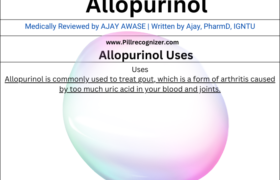Medically Reviewed by AJAY AWASE | Written by Ajay, PharmD, IGNTU
Table of Contents
USES:
What is the purpose of allopurinol?
Gout is a frequent form of arthritis brought on by an excess of uric acid in the blood and joints. Allopurinol is used to treat this condition.
If you have some forms of kidney stones or are undergoing chemotherapy for cancer, allopurinol may also be used to reduce your uric acid levels.
Other conditions may also be treated with allopurinol, as determined by your healthcare provider.
How does the mechanism of action of allopurinol work?
Allopurinol functions by lowering your body’s uric acid production. Too much uric acid can lead to kidney stones or the formation of crystals in your joints, which can aggravate gout flare-ups. Kidney stones and gout flare-ups can be avoided with allopurinol by lowering the production of uric acid.
In what dose forms is allopurinol supplied?
The following oral dose versions of allopurinol are available: Lopurin, Zyloprim, and generic allopurinol.
- 100 mg oral tablets
- 200 mg oral tablets
- 300 mg oral tablets
How ought I to keep allopurinol?
Store allopurinol between 68 and 77 degrees Fahrenheit (20 and 25 degrees Celsius) at room temperature. For brief periods of time, as during transit, it can be exposed to temperatures between 59 and 86 degrees Fahrenheit (15 and 30 degrees Celsius). Keep dry and cold for storage. Remain closed tightly.
Side Effects:
Which allopurinol side effects are most prevalent?
The following is a list of allopurinol’s most typical adverse effects. If you have any of these unpleasant side effects, let your doctor know.
- Rash on the skin (see below)
- The diarrhea
- emesis
Allopurinol may have other adverse effects not mentioned here. Should you believe you are experiencing a medication adverse effect, get in touch with your doctor. You can report side effects to the FDA in the United States by contacting 800-FDA-1088 or visiting www.fda.gov/medwatch. You can report side effects to Health Canada in Canada by calling 866-234-2345 or by visiting www.health.gc.ca/medeffect.
What harmful effects might allopurinol cause?
The most severe allopurinol adverse effects, however less frequent, are included here, along with advice on what to do in their event.
Flares of Gout. Before alleviating your gout symptoms, allopurinol may make them worse. Reducing uric acid levels to a level where your gout flare-ups are under control may take many months. It’s critical to adhere to your doctor’s advice, which may involve taking pain and/or inflammatory medication while taking allopurinol and maintaining a healthy weight.
Damage to the kidneys. Allopurinol use carries the risk of kidney injury. If any of these signs of kidney disease apply to you, give your healthcare practitioner a call immediately.
- Reduced need to pee
- Swelling in your feet, ankles, or legs
- Weakness or unusual tiredness
- Difficulty catching your breath or chest pain/pressure
- Confusion
- Nausea
- Seizures
Harm to the liver. Allopurinol use carries a risk of hepatotoxicity, or liver damage. Should you experience any of the following signs of liver injury, get in touch with your doctor straight once.
- vomiting or feeling queasy
- abdominal or stomach ache
- High temperature
- Weakness or excessive fatigue
- Itching
- appetite decline
- Pale excrement
- urine with a dark hue
- Your complexion or the whites of your eyes becoming yellow
Blood Conditions. Blood diseases include agranulocytosis, aplastic anemia, hemolytic anemia, low platelet counts (thrombocytopenia), and low white blood cell counts (leukopenia) can be brought on by allopurinol. Should you have any of the following signs of blood problems, stop taking allopurinol and seek immediate medical attention.
- High temperature
- Breathlessness
- pale or tan skin
- Simple bleeding or bruises
- recurring infection
- unusual exhaustion or weakness
- feeling lightheaded, dizzy, or like you’re going to pass out
- Headache
- an accelerated or irregular heartbeat
Lightheadedness and tiredness. You may feel drowsy or lightheaded after taking allopurinol. Before you know how allopurinol affects you, avoid driving and other occupations that call for coordination or attentiveness.
Extreme Skin Reactions. When left untreated, toxic epidermal necrosis (TEN) and Stevens-Johnson syndrome (SJS) are severe skin responses that can be fatal. Allopurinol can trigger these skin reactions. Call your doctor immediately and stop taking allopurinol if you have a rash. If you have any of the following SJS or TEN symptoms, get emergency care right soon.
- painful red or purple skin that peels off and appears burned
- Blisters or a flat red rash on your lips, nose, genitalia, or skin
- eyes that are watery, red, and hurt.
Extreme Allergic Responses. Allopurinol has the potential to induce allergic responses, including DRESS reactions. Drug Reaction with Eosinophilia and Systemic Symptoms is referred to as DRESS. Another name for it is multiorgan hypersensitivity. This is an adverse reaction that can impact your heart, kidneys, liver, and other organs. If you experience any of the following signs of a severe allergic reaction, stop taking allopurinol and get medical attention straight once.
- wheeze or difficulty breathing
- pounding in the heart, fever, or general discomfort
- enlarged lymph nodes
- swelling of the neck, mouth, tongue, lips, or face
- Difficulty swallowing or constricted throat
- Itching, rash, or hives—pale red pimples on the skin—on the skin
- vomiting or feeling queasy
- lightheadedness, dizziness, or fainting
- cramps in the stomach
- Joint discomfort
- dark-colored feces
- Your complexion or the whites of your eyes becoming yellow
Warnings & Precautions:
To whom not to prescribe allopurinol?
Allergies to substances. Allopurinol should not be used by anyone who is allergic to any of the following substances.
- Theopurinol
- Lopurin
- Zyloprim
- Any component of the particular product that was dispensed
You can find out the whole list of ingredients in the particular allopurinol products that your pharmacy carries.
What information should I get before taking allopurinol?
Allopurinol should only be taken as directed by a medical professional. Take it as directed.
Even if someone else has the same illness as you, never share allopurinol. It could hurt them.
Allopurinol should be kept out of children’s reach.
When taking allopurinol for gout treatment, it’s possible that your symptoms will first get worse before getting better. Discuss with your doctor how to handle flare-ups of gout while taking allopurinol.
Take allopurinol right after eating to minimize upset stomach.
Keep yourself well-hydrated to avoid kidney stones.
What should I discuss with my doctor before taking allopurinol?
Inform your doctor about any of your medical issues as well as any over-the-counter (OTC) or prescription medications, vitamins, minerals, herbal remedies, and other supplements you take. This aids in their assessment of whether allopurinol is appropriate for you.
Health Conditions from the Past and Present. If you have any of the following, let your healthcare professional know.
- renal issues
- Liver issues
- blood conditions
- Cancer
Tribes: African, Asian, Native Hawaiian/Pacific Islander. If you are of African, Asian, Native Hawaiian, or Pacific Islander ancestry, let your healthcare professional know. Your healthcare provider may want to do genetic testing if you come from one of these ancestries in order to assess your likelihood of experiencing a particular allergic reaction to allopurinol.
Supplements and Other Medication. Allopurinol may have interactions with dietary supplements and other medications. Inform your doctor about all prescription and over-the-counter (OTC) medications, vitamins, minerals, herbal items, and other supplements you take before beginning allopurinol. For further information, see the Interactions section.
Maternity. The potential effects of allopurinol on pregnancy and potential harm to the fetus are unknown. Inform your medical professional if you are or intend to become pregnant. If you are pregnant or trying to become pregnant, your doctor will advise you on the appropriate use of allopurinol.
Feeding a baby. Allopurinol should not be used for a week following a dose or during breastfeeding. Allopurinol finds its way into breast milk. Inform your medical professional if you are or will soon be nursing a child.
Interactions:
Do foods or beverages interact with allopurinol?
Allopurinol and meals or beverages do not currently interact.
The potential impact of alcohol consumption on allopurinol is unknown. If you consume alcohol while taking allopurinol, your chance of feeling lightheaded and sleepy may rise.
Does allopurinol have any pharmacological interactions with other medications?
It is important to inform your healthcare practitioner about all the vitamins, minerals, herbal items, prescription drugs, over-the-counter (OTC) medications, and other supplements you use.
Specifically, before taking allopurinol, be sure to mention if you are utilizing any of the following.
- Any thiazide diuretic, such as chlorthalidone and hydrochlorothiazide, which are frequently prescribed to lessen edema (fluid accumulation) or lower blood pressure
Antibiotics called ampicillin or amoxicillin are used to treat infections.
Cyclosporine is an immunosuppressive medication (Gengraf, Neoral, Sandimmune, and others). - Any medication used in the treatment of cancer
- Certain disorders are treated with immune-suppressive medications such as azathioprine or mercaptopurine.
- The medication theophylline is used to treat specific respiratory disorders
- Probenecid or pegloticase (Krystexxa), two more gout medications
- The blood thinner warfarin (Jantoven)
Overdose/Missed Dose:
If I unintentionally take too much allopurinol, what should I do?
If you or someone else has taken too much allopurinol, seek medical attention straight away, dial 911, or get in touch with an 800-222-1222 Poison Control center.
How should I do if I forget to take my allopurinol dose?
Take the missed dose as soon as you remember it if you miss it. Take only the next dose, skipping the missed one if it is almost time for your next one. Never take more than one dose or two.



